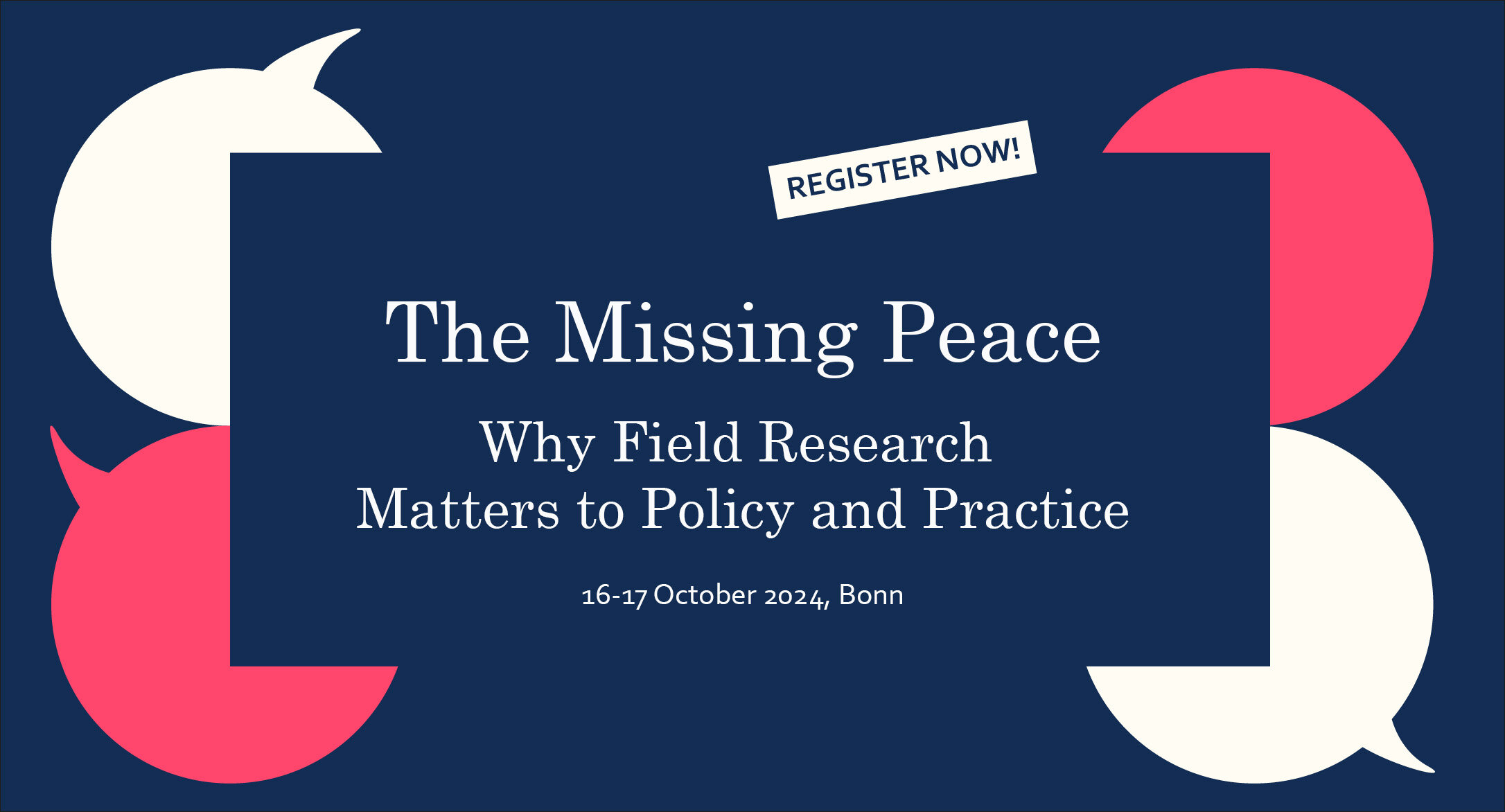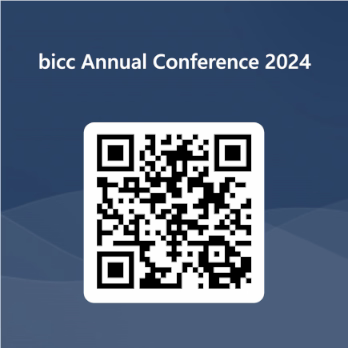2024
What do we know about the local realities of violent conflict? And how can we use what we know for peacebuilding? There are often considerable gaps between beliefs and practices “on the ground” and national and multilateral peacebuilding, development and humanitarian efforts. The bicc 30 years Anniversary Conference aims to explore how these gaps can be bridged. We are bringing together international academics, experts and practitioners to discuss innovative approaches to knowledge transfer.
Experience from various bicc research projects suggests that knowledge of local conflict dynamics can improve government policies and external engagement—at minimum to ‘do no harm’ and at best to prevent or end violence. Our conference will, therefore, focus on the opportunities for integrating findings from field research into national and multilateral approaches to sustainable peacebuilding and conflict transformation. We will look at concrete examples of research in different conflict regions as we discuss local peacebuilding, the distribution of small arms and light weapons, non-state armed groups and forced migration and return.
Day 1
16 October 2024
Bonn Universitätsforum
Heussallee 18–24, 53113 Bonn
in person
30 Years for a More Peaceful World
18:00–18:30 Words of Welcome
Conrad Schetter, Director of bicc
Gonca Türkeli-Dehnert, State Secretary, Ministry for Culture and Science of North Rhine-Westphalia
The Missing Peace. Why Field Research Matters to Policy and Practice
18:30–19:30 Panellists
• Anka Feldhusen, German Federal Foreign Office
• Elizabeth Ferris, Georgetown University
• Paul Holtom, United Nations Institute for Disarmament Research (UNIDIR)
• Conrad Schetter, bicc
Chair: Maurice Döring, bicc
19:30
Celebrating 30 Years of bicc
Evening Reception with Wine and Appetisers
Day 2
17 October 2024
Gustav-Stresemann-Institut,
Langer Grabenweg 68, 53175 Bonn
hybrid
Zooming in on Peace
Exploring New Trends in Peacebuilding Through the Lens of Research, Policy and Practice
Understandings of peace, peacebuilding and conflict resolution vary across conflict-affected regions. However, local understandings are often neglected in peacebuilding activities. This panel will explore whether and how they can be integrated into political and practical attempts at conflict resolution. Panellists will reflect on how current approaches can be adapted to take account of local understandings and, ideally, contribute to the development of more sustainable solutions.
10:00–10:30 Words of Welcome
Conrad Schetter, Director of bicc
Introduction
Elvan Isikozlu, Carina Yıldırım-Schlüsing, Marc von Boemcken, bicc
10:30–12:00 Panellists
• Esther Omam, Reach Out Cameroon
• Boubacar Haidara, bicc
• Tomas Kontogeorgos, UNDPO
Chair: Claudia Breitung, bicc
12:00–13:00 Lunch
part 1 in person - part 2 hybrid
Peace Between the Lines
Connecting Local Dynamics and Global Solutions for Armed Conflict
Armed violence and illicit flows of arms across borders continue to pose challenges to global, regional, national and local security and stability. While global solutions are often sought after, local dynamics are rarely taken into account. For example, there is a gap between local and (inter)national knowledge of the cross-border dynamics of arms flows and armed violence. This participatory panel will explore how a better understanding of the operations of armed groups and illicit arms flows in border regions can contribute to more sustainable solutions for activities that reduce violence.
Our panel on “connecting local dynamics and global solutions for armed conflict” will dive deeper into local conflict dynamics in different parts of the world, including cross-border dynamics, illicit flows of arms and linkages to armed violence. We want to explore questions, such as: how are armed groups operating in border areas and what are the impacts of illicit arms flows in these spaces and beyond, for instance across national borders and transborder areas?
In a second step, we want to further examine whether what is happening on the ground translates into national, regional and international policy. Is the local level adequately considered in solutions developed at the higher levels? What role does research play in this knowledge transfer? This is what we want to discuss in an interactive manner together with the audience and our panel guests.
13:00–14:00 part 1: Gallery Walk (in person)
Panellists
• Juliana Buzi, UNDP
• Tatiana Smirnova, Université de Sherbrooke
• Oyewole Oginni, bicc
• Paul Holtom, UNIDIR
Chair: Milena Berks, bicc
14:00–14:30 part 2: Presentation of Outcomes (hybrid)
At 2 pm we will come back to plenary to debrief the central inputs of the gallery walk together with the audience. Panellists will share one key message from the walk with us and short reflections on the role of research for their work in line with our main theme of the conference: “Why field research matters to policy and practice”. An open debate with the audience will follow to wrap up the session, including the audience online.
We look forward to seeing you there!
14:30–15:00 Coffee break
hybrid
With us for Peace
Acknowledging Migrants` Experiences in Policymaking
Migrants’ experiences must be reflected in migration-related policies. This panel explores how the consideration of the intersectional realities of mobile people can be acknowledged in policymaking. It asks how best to strengthen the participation of migrants in processes that directly affect them so that policymaking reflects and responds to their reality.
15:00–16:30 Panellists
• Osman Bahadır Dinçer, bicc
• Elizabeth Ferris, Georgetown University
• Shaza Alrihawi, Global Refugee-led Network (GRN) and Global Independent Refugee Women Leaders (GIRWL)
Chair: Terry Martin, journalist
16:30–17:00
Closing: For the Future of Peace Research
Elvan Isikozlu, Carina Yıldırım-Schlüsing, Marc von Boemcken, bicc
Concluding Remarks by
Berivan Aymaz, Vice-President of the Parliament of North Rhine-Westphalia
Please note that pictures or videos will be recorded during the conference. These recordings will be used for the purpose of publication on bicc’s homepage, social media and in print and online publications. Please inform our team at the registration at the event if you do not wish to be recorded. After the event, you can object to the use of the recordings at any time without giving reasons. Your recordings will then be deleted or made unrecognisable.
You can find our privacy notice here: https://www.bicc.de/datenschutzerklaerung





.svg)